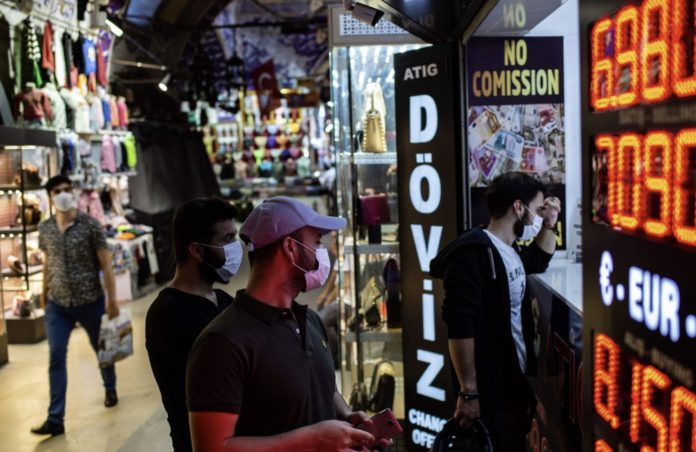The recent fluctuations are specific not only to Turkey but to all other global economies as well, experts say, stressing that, once the currency stabilizes, the country would continue to attract investments with its sound structure.
With heightened ambiguity on the long-term effects of the global health crisis brought by the coronavirus pandemic, world economies continue to suffer, while emerging markets, such as Turkey, are vulnerable to different variables. The excessive market volatility amid high fluctuations in exchange rates and the recent depreciation of the Turkish lira, however, are relatively short-term developments, and the country will recover from them, experts argue against the backdrop of positive macroeconomic indicators in the country.
“We are in a period of emerging market weakness right now. Turkey’s currency has depreciated along with other emerging market currencies, actually faring better than Brazil and South Africa in 2020 and slightly worse than Mexico. This should have been expected. When global crises hit, emerging market currencies suffer,” Turkish economist Taha Meli Arvas said, noting that the important metric to watch is “how quickly these countries emerge from this crisis, one which is the worst since the Great Depression.”
On Friday, President Recep Tayyip Erdoğan also commented on the recent spike in the U.S. dollar-Turkish lira disparity.
“The Turkish economy is structurally strong, recent fluctuations in exchange rates are temporary and the Turkish lira will bounce back to the normal level depending on global developments,” Erdoğan also said during a press conference in front of the Hagia Sophia Grand Mosque in Istanbul. The president added that all other numbers indicate an upward trend and that despite some difficulties Turkey will maintain its strength during this challenging period of the pandemic.
The gross national income (GNI) was $236 billion (TL 1.7 trillion) in November 2002 when the ruling Justice and Development Party (AK Party) first took office while it had reached $754 billion by 2019, Erdoğan said. The per capita GNI has also increased.
The country’s employment was 19.6 million back in 2002 and has increased to around 28.8 million in 2019, Erdoğan stressed, noting that the country’s exports jumped from $36 billion to $180 billion in the same period. Employment and the export businesses were also a priority during the pandemic and started showing positive results of measures taken during that period, he added.
The Central Bank of the Republic of Turkey (CBRT) foreign exchange market reserves have reached $105 billion from 2002 figure of $27.5 billion, according to the figures announced by the president.
Since the beginning of the year, developing countries’ currencies such as Brazil, Mexico, South Africa and Russia have experienced depreciation between 18% and 33%, and the depreciation in Turkish lira is at the level of 23%.
The U.S. dollar on Thursday hit all-time highs against the Turkish lira. The lira fell to 7.30 against the dollar at 5:40 p.m. local time, past the previous low of 7.26 in May. The U.S. dollar-Turkish lira exchange rate stood at 7.30 as of 9.30 a.m. local time (6:30 a.m. GMT) on Friday, up from Thursday’s closing rate of 7.29.
The euro-Turkish lira exchange rate rose to 8.65, verses 8.64, and one British pound was traded for TL 9.60. It was TL 9.85 at the previous close.
Foreign exchange and commodity markets specialist Kıvanç Alphan said that it is accurate to evaluate the recent depreciation of the lira in accordance with other developing markets.
The increasing number of COVID-19 cases in the U.S. weakens the U.S. dollar, Alphan said; however, while, in the past, similar weaknesses would have triggered fund flow to developing markets, “the case is now the exact opposite during the pandemic as the weakness of the U.S. dollar does not provide a fund flow to those markets but rather causes an outflow.
“Global economies are facing a very much different situation now that they have never experienced and the uncertainties on the growth of the developing countries are only accelerating the anxieties regarding those emerging markets, causing fund outflows,” he said, which delivers an upward pressure on the exchange rates.
Turkey has delivered a series of stimulus packages and taken various measures to curb the virus’ impact on the economy while preserving employment and keeping business activity on flow and encouraging growth.
Alphan said that those stimulus moves which were similarly undertaken by many developing countries can cause short-term upward mobility on exchange rates or on inflation; however, these moves are necessary. Similarly, many countries tried to keep their economies alive through an unprecedented monetary expansion as well as direct financial assistance.
Turkey’s growth highest among EU, G-20, OECD
Turkey, meanwhile, in the first quarter of 2020 posted a growth rate of 4.5 percentage points, by far the first among the European Union countries, G-20 countries and the Organisation for Economic Co-operation and Development (OECD) countries.
“Turkey has growth, despite its balance of payment issues, Turkey remains very attractive to investors precisely for this reason. When the currency stabilizes, Turkey will continue to attract investment and outperform its peers because it’s structurally sound,” Arvas said.
Enver Erkan, an economist at Tera Yatırım, also said that a rapid recovery is observed in many economic activity indicators in the March- July period, beginning with the July normalization process.
He pointed out that the main contraction impact from COVID-19 is set to be seen in the data for the second quarter and that the increasing recovery momentum in the first data for July improves the expectations for the third quarter and beyond.
“However, the sustainability of the recovery will depend on … whether the conditions for the virus worsen or whether the status quo can be maintained, in a worst-case scenario,” he added.
By AYŞE BETÜL BAL with DAILYSABAH



























